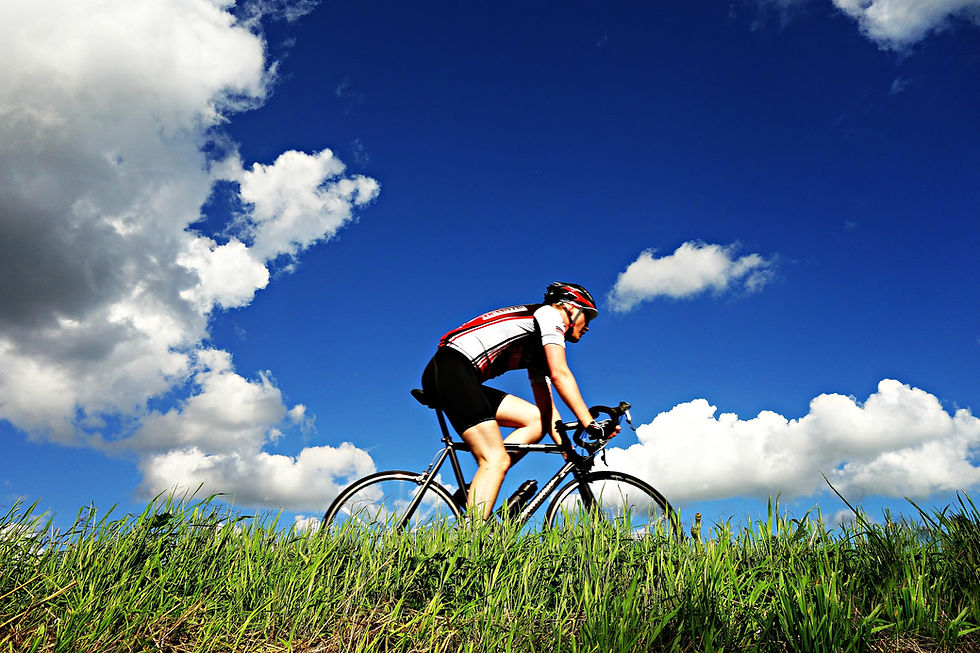Finding Zen on two wheels
- Peter Richards

- Jul 22, 2020
- 4 min read

Many people have instructed me on meditation and its profound benefits. Wherever you look on the well-being or mindfulness shelf (whether physical or digital) there is an abundance of information. From Goan Yoga retreats to Zen Buddhist master classes there is a plethora of advice and guidance on how to achieve the perfect meditative state. I am, in fact, completely sold on the art of mediation and struggle manfully to achieve the necessary inner peace prior to starting each day. At six o’clock each morning I do a little yoga then arrange

myself in a kneeling position on my mat, set the alarm for 15 minutes and try to “get into one”. At first, I found the practice impossible – trying to clear my mind of all unnecessary clutter to achieve this state of Nirvana e.g. bringing awareness to my present experience. To say the least – I found it nigh on impossible. However the more I practised the easier it became.
My first challenge was to understand what it actually was and contrary to popular opinion – mine included – it's not all about finding completely inner calm or clearing your mind of all thoughts. Undoubtedly these are definitely benefits that can be achieved by best meditative practices.
Sadly, the lives of most of us are so noisy and our minds so cluttered with anxieties of the past and the future that finding that ‘still, small voice of calm’ is beyond many of us.

Deadlines or looming targets at work can be all-
consuming whilst dwelling on missed opportunities of the past can also produce the same detrimental reaction. All this noise whether real or perceived prevents any quiet from washing over us and actually thriving in the “present".
I don’t know why but it was only in recent years that I drew the comparison between cycling and just being able “to be”. I am a confirmed roadie and took the ferry to France one summer’s day. I disembarked in Normandy and set out at six a.m. in the morning along beautiful, smooth, traffic-less French roads – and it just happened.

With the rolling waves on one side and the undulating Norman hills on the other, I found myself ‘in the zone’. The longer I went on the more I became part of it. I was not hungry, or thirsty or tired and the bike just seemed to take over. In this state my legs became tireless and even my inner thighs failed to give me much grief (well until the next day, of course). This Damascene journey was life-changing and the connection between body and mind became very clear.
I believe that for me, at least, cycling is the perfect activity for stress relief. Furthermore, the relative speeds that I cycle at mean that I need an elevated level of focus – on keeping safe, on track and getting there.

It takes me away from my daily diet of stress and anxiety and keeps me on the ‘straight and narrow' (sorry to mix my metaphors). It literally removes me from one daily humdrum existence of care and worries to a place where I can think only about the ‘now”. If I were to try and practice this sort of meditation in any other public place it would, understandably, be quite difficult not to be self-conscious. However from the saddle – absolutely no problem.
Ok, here’s the scientific bit. When you get stressed something happens in your body. Specifically, a gland called the hypothalamus releases a hormone combo of cortisol and adrenaline and the body creates the “fight or flight” response. As cavemen, this response was very handy when fighting off other cavemen and helped our distant ancestors survive many a life-or-death situation. Today, the body reacts to stress in the same way as it did then but to all sorts of low-level anxieties. It is still a very useful response for your body to give you a supercharge when you are in the jaws of death but less useful when you are just worried about your train being late. Having your body create a "fight-or-flight" response every 30 minutes or so of your everyday metropolitan existence is very wearing and ultimately highly debilitating.
Eventually, the stress becomes one-way traffic and if you have no outlet for de-stressing it will eventually bite you in the bottom (sometimes quite literally). I find the act of riding my bike – particularly on longish trips – has a very calming effect on me. This is especially true if I am cycling in an equally calm environment e.g. rural Normandy. The mere act of repeatedly turning my pedals or concentrating on my breathing is enough to induce a meditative state preventing my mind from concentrating on what is happening in the office for example. You don’t have to immerse yourself in the beauty of the Breton roads or the sheer exhilaration of descending the Ventoux to escape any random daily thoughts from entering your consciousness – but it does help. What is more is that finding the perfect balance between disaster and success when, for example, you are rolling down the mountain at 50mph is all-encompassing. Nothing else matters and you are in the zone!





































Comments